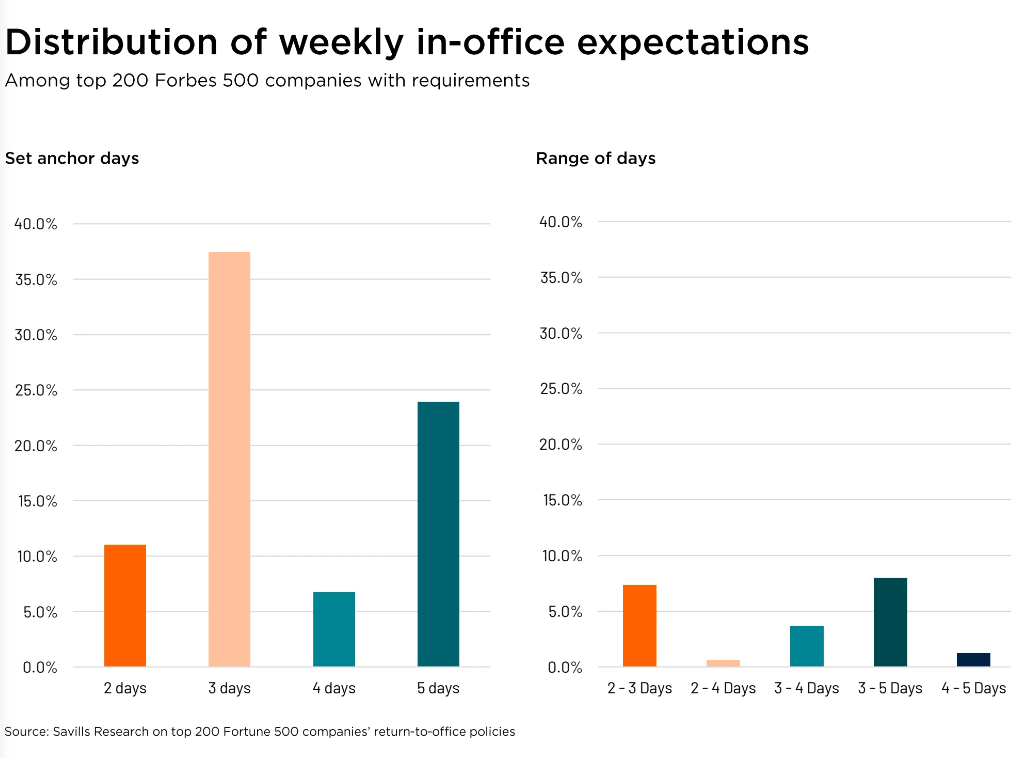More firms are setting stricter in-office expectations, including minimum in-office requirements, with larger companies leading the shift.
As of early this year, nationwide office traffic remained at 59 percent of pre-pandemic levels, but that could change if corporate pressure intensifies, according to a new report from Savills.
The report analyzed the return-to-office policies of the top 200 Fortune 500 companies. Requiring two to four days per week in the office (the Fixed-Hybrid model) has been adopted by 56.4 percent of survey respondents. Office-First (24 percent), Flexible Hybrid (17.1 percent) and Remote-First (2.5 percent) also registered.
READ ALSO: Where Office Space Wins
“We were surprised to discover that flexible-hybrid models—where employees choose where to work—made up a smaller share of company policies than office-first models,” Devon Munos, senior vice president, head of Americas research at Savills, told Commercial Property Executive.
“We’ve seen more office-first announcements recently, but it was interesting to see the trend clearly reflected in the data.”

Three days per week is the most common mandate among companies with required in-office presence, followed by five days. New York and Miami are two markets leading the return-to-office mandates.
Noncompliance with the return-to-office policy is a concern for many top 200 companies; 27 of them have announced disciplinary actions, while nine firms might even consider potential termination.
According to Munos, with new economic uncertainty emerging in 2025, employers may have additional leverage to strengthen return-to-office mandates, especially if workers feel less secure in their jobs.
“Beyond mandates, companies are looking to naturally draw employees back by creating workplace environments worth the commute—spaces that support independent work and meaningful in-person collaboration, offer access to leadership and provide abundant amenities,” she concluded.
RTO mandates, scary for some
A recent survey from FTI Consulting showed that the majority (70 percent) of workers who are fully remote or in a hybrid arrangement said they are very likely or somewhat likely to seek alternative employment if they are required to return to the office full time (at least 30 hours per week) at their current salary.
The survey participants, who numbered 1,000 people who work in a corporate office or home office, were asked about their views of a hypothetical return-to-office mandate. About three-quarters (74 percent) of fully remote workers said they will likely seek employment at another company if required to return to the office full time. In comparison, 62 percent of hybrid workers made the same statement.
‘Golden handcuffs’
Fortune 500 companies have become more aggressive with their return-to-office mandates, Pierre Debbas, co-founder of Romer Debbas LLP, told CPE.
“Many of them are able to do this given the old adage of ‘golden handcuffs,’ ” Debbas said.
“As someone who runs a small to mid-sized business, a full return-to-office mandate would lead to people leaving our company. While we encourage office attendance to be as high as possible, we have embraced the hybrid model, which, for most companies, works well and provides the people in our firm with a good balance.”
Nonprofits among the last to return
Nonprofit organizations are finally embracing the return to office after being among the last sectors to do so, Stephen Powers, co-founder of OPEN Impact Real Estate, told CPE.
He added that many nonprofits are now requiring employees to be in the office two to three days per week, as they’ve become aware in-person collaboration is “essential for training the next generation of leaders.”
“There was an ‘aha moment’ when middle-level managers realized they weren’t providing the same mentorship they had received early in their careers,” Powers mentioned. “While nonprofits deeply value equity for their employees, especially those with long commutes, they find that maintaining organizational culture and effective training requires intentional in-person practices.”



